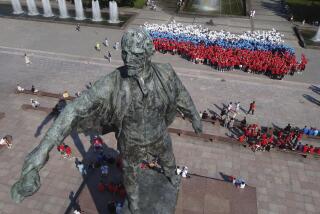A Cult of ‘Balance’ Before Freedom : Perestroika: Even if some in the West fear that change jeopardizes stability, Gorbachev understands that the option, totalitarianism, is no option at all.
- Share via
One magic word is being used these days to justify American concerns for the safety of the Soviet empire: balance. Instability in the Soviet Union jeopardizes the balance and that jeopardizes peace, the responsible politicians say. The troublemakers of Lithuania don’t think about the total balance, they say.
Not long ago, the same people used to say that the troublemakers in Gdansk and Warsaw should keep quiet so as not to jeopardize the world’s balance. Now, since Polish, Hungarian, Czechoslovak, Romanian and, hopefully, East German revolutions are on their way, they say: Those troublemakers from Vilnius, Riga and Tallin, those from Georgia, the Ukraine, Moldavia and Armenia should keep quiet. For the sake of the holy balance.
But there’s one thing they don’t like to mention. The balance is attractive only for those who are comfortable. The birth of anything new has to destabilize the balance. Overthrowing of totalitarian regimes is, and must be, destabilization of the balance, of the old stagnation. Destroying the walls, breaking the chains, ruining the prison automatically means destruction of the balance.
The question is, will Moscow stand for it? No one knows except Mikhail Gorbachev, but I think he has already proved that it will. Not only because the other possibility, the use of force, would ruin Gorbachev’s longtime construction, the scaffolding he’s standing on. But also because he clearly sees the necessity of changes. All kinds of changes. Gorbachev’s visit to Lithuania seems to prove that he’s determined to solve the problem the civilized way. He’s only asking for time.
Gorbachev brings openness not because he is so generous and full of spiritual beauty, but because it gives the empire the chance to survive the unavoidably approaching turmoils. Gorbachev knows that the only way to save the crumbling empire from total collapse and uncontrolled eruption is to confine the totalitarian power.
It’s ironic that the failure of the totalitarian system occurs through total inefficiency in economy, not through total violation of human rights. In this case Marx was right. Basic living conditions decide what ideas are being born. There should be no illusion; if the totalitarian system, by some miracle, would work economically, there would be no perestroika , no openness.
Perestroika is not a revolution. It’s a way to control revolution, or rather to avoid revolution. It is revolution from above, the bold attempt to get rid of inefficient totalitarianism.
That’s why Gorbachev is ready to accept the political changes that come with perestroika --in Eastern Europe as well as in the Soviet Union. I’m not saying that he’s happy about those increasing demands of freedom and liberty. He’s not, but he knows he has to deal with them, and--because he’s smart enough--he’s ready to accept them in one or another way, gradually, with safety measures.
That’s why the Baltic struggles for freedom jeopardize the balance only for Western old-style chess players, who don’t realize that the black and white chess board has been already removed and we play some very different game, with different rules, and many more than only two players.
Of course there’s a moral perspective as well. Who will dare to tell Lithuanians, Estonians or Latvians that Poles, Hungarians and Czechs have the right to be free but they, who were invaded by Moscow only a few years earlier, do not? I’m perfectly aware that this perspective is not tempting for responsible politicians who care about the balance. Like President Bush, who caresses Chinese leaders six months after the massacre on Tian An Men Square, these politicians look beyond and think in general scale.
Ronald Reagan was different. And with all his stubbornness and inflexibility, he somehow created Gorbachev. He helped him to understand that Leonid Brezhnev’s “Afghanistan solution” was no solution at all. If Bush had come before, not after, Reagan, he would have, as a “responsible politician who thinks about balance,” kissed Brezhnev’s cheeks several months after the invasion. And standing in the second line, Gorbachev wouldn’t get the lesson.
In fact, the so-called flexibility of George Bush undermines and jeopardizes democratic processes, because he shows that bloody dictators or invaders won’t be separated and condemned. Nicolae Ceausescu closely watched Bush’s efforts to get in touch with Chinese leaders, to convince them how sorry he was for the troubles they had. Ceausescu clearly got Bush’s lesson.
Now compare Gorbachev and Ceausescu. Which one of them can be called more concerned about “the balance, the stability”? Ceausescu of course. It was he, not Gorbachev, who chose to solve the problems the old way, to maintain the status quo. Gorbachev is much further ahead.
There was another time when the balance was in jeopardy. One big power, France, supported the troublemakers against the other big power, Britain. Somehow the troublemakers won. The balance was destroyed. The troublemakers’ ringleader was named George Washington.
More to Read
Sign up for Essential California
The most important California stories and recommendations in your inbox every morning.
You may occasionally receive promotional content from the Los Angeles Times.













